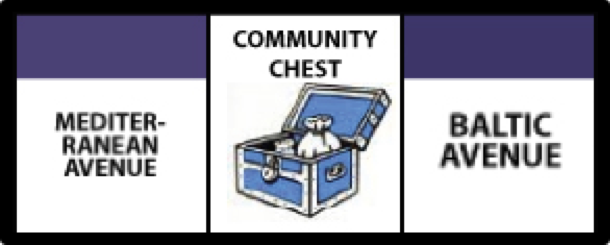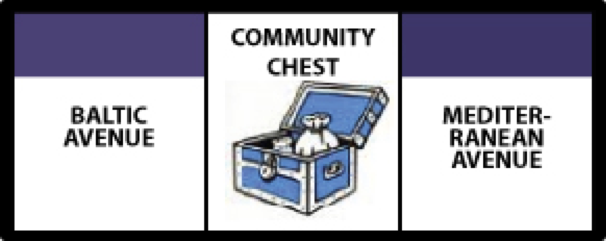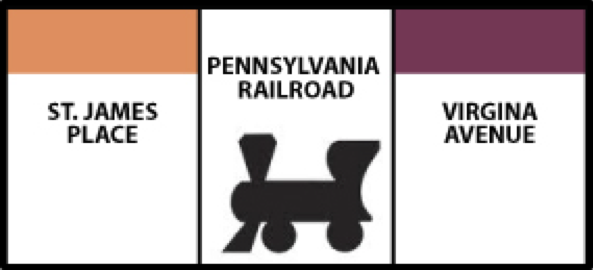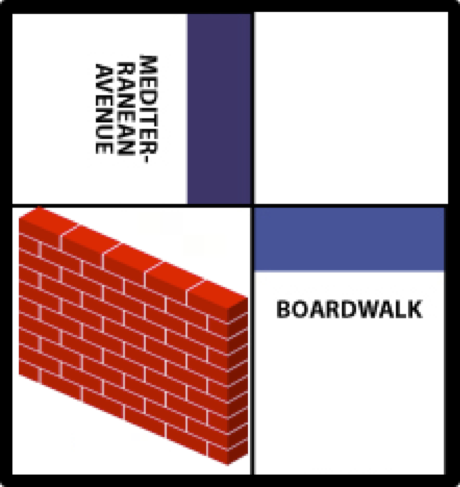For the second question on my Property 2 Exam, I was inspired by the classic real estate game, Monopoly, and the Presidential candidates.
- Marco sells the same pieces of land to Ted and Hillary, while the former squats on it.
- The planning commission demands an exaction from Rand to build a bridge over railroad tracks.
- Bernie grows marijuana on Marvin Gardens, but there is temporary flooding from the Water Works.
- Donald builds a “huge” wall on the Boardwalk to keep out migrants from Mediterranean.
The jokes write themselves, and I managed to factor in the actual Monopoly game board. Question #1 is here, the exam is here, and the A+ answer is here.
Instructions: You are a law clerk for a judge in the trial court in Monopoly, New Jersey. You are asked to consider five property issues concerning six friends: Ted, Marco, Hillary, Rand, Bernie, and Donald. New Jersey applies all common law property rules as articulated in the Restatement (First) of Property. The statute of limitations for all causes of action in New Jersey is two years. New Jersey applies a notice recording statute.
—
The seaside town of Monopoly, New Jersey straddles both sides of the proverbial train tracks. The properties range from the rundown houses on the Mediterranean to the gleaming hotels on the Boardwalk, and everything in between. Six friends start their real estate dealings, as always, with the roll of the dice.

Turn 1
Ted makes the first move, and seeks to acquire the blighted lots of Baltic and Mediterranean from Marco. Marco provides Ted with a survey s 1qtating that Baltic stands fifty feet to the east of the Community Chest Bank, and that Mediterranean stands fifty feet to the west of the Community Chest Bank.

Marco’s Survey
Ted opts only to purchase Mediterranean, described on the deed as the lot 50 feet to the west of the bank. Marco gives Ted a quitclaim deed, which was never recorded.
The following week, Hillary offers to purchase both lots from Marco for $60,000. Marco shows Hillary the same survey he gave to Ted. Hillary has a bad feeling about it, and commissions her own survey. It turns out Marco’s survey was backwards. In fact, Baltic was fifty feet to the west of the Community Chest Bank, and Mediterranean was fifty feet to the east of the Bank.

Hillary’s Survey
Hillary agrees to purchase both lots from Marco for $60,000. Marco and Hillary shake hands on the deal, and Hillary hands him a suitcase full of $60,000 cash. Later that night, Hillary called Marco, to ask him if he would give her a deed for the two lots. Little did she know that Marco was savagely beaten into a coma when a gang stole his cash-filled suitcase.
The next day, Hillary learns that Ted was living on the westward lot, which was in fact Baltic, and not Mediterranean. She shows Ted the survey, and tells him to get off. Ted refuses, and insists that he is staying on the westward lot, whatever it is called!
Three years later, Hillary files suit to eject Ted from Baltic, the westward Lot. Ted counterclaims that he has acquired Baltic through adverse possession. Marco, who miraculously awoke up from his coma, asserts that he was still the owner of both lots, and that Hillary never lawfully acquired them.
Turn 2
Rand owns the lots on St. James and Virginia. Between the two lots are train tracks for the Pennsylvania Railroad.

Rand has a house on Virginia. Rand seeks to build a hotel on St. James, and applies for a building permit. The Monopoly Planning Commission, without granting or denying his permit applications, suggests that Rand hire a local construction firm to build a bridge that stretches from St. James over the railroad tracks to Virginia. The Commission tells Rand that the bridge will help people walk from the train station to his hotel, and improve traffic conditions on the busy street. Rand is outraged, and refuses to pay to build the bridge. Rand files suit in the trial court, claiming that the Planning Commission violated his rights under the Takings Clause of the 5th Amendment.
Turn 3
Bernie rolls the dice next. He owns a farm on Marvin Gardens. To the west of Marvin Gardens is the Monopoly Jail and to the east is the Monopoly Public Water Works reservoir.

Bernie’s sole crop is marijuana, which was recently legalized in the state. The soil on Marvin Gardens is ideally suited for cannabis. However, the scent of the marijuana, which wafts over the walls of the jail, incites the prisoners to try to escape on a daily basis. It has become a serious security problem. The Monopoly City Council passes an ordinance, requiring that all marijuana growers are required to install 50-foot screens around the borders of their farms that can filter out the scent. Bernie refuses to build the screen, and files suit against the City Council in the trial court, alleging that the ordinance violates his rights under the Takings Clause of the 5th Amendment.
Bernie’s problems don’t end there. In order to provide enough water for his marijuana crops, the Water Works built a subterranean pipeline from the reservoir to the ground underneath Marvin Gardens. In the middle of the winter—long after Bernie’s crops were harvested—the pipeline bursts. The entire farm is flooded, and the ground underneath the farm sinks one inch. However, because the accident happened after the harvest, the flooding and subsidence did not damage any crops. Bernie files suit against the Water Works in the trial court, alleging that the burst pipeline resulted in a violation of his rights under the Takings Clause of the 5th Amendment.
Turn 4
Donald owns the opulent beachfront Boardwalk Hotel. Donald starts to build a “huge” wall surrounding the hotel, so he wouldn’t have to deal with or see the dispute on Mediterranean. The wall has a “beautiful” door to allow people cross onto the beach.

The Monopoly City Council amends the zoning code, and imposes a five-year moratorium on building anything that is “aesthetically unpleasing” on the beach. The purpose of the moratorium is to study how eliminating unsightly constructions near the beach improves the public’s physical and visual ability to access the shoreline. The moratorium may be renewed for additional five-year terms, in order to provide sufficient time to analyze the issue.
Donald submits his plans to finish the wall to the Monopoly Zoning Commission. The Commission determines that Donald’s red-brick wall would be “aesthetically unpleasing” because it is “out of place.” Donald asks for further clarification, but the Zoning Commission offers none. As a result, the Commission determines that the plan is subject to the moratorium, and Donald cannot complete his wall. Donald appeals the Commission’s findings to the trial court.
—
Each of these five suits is consolidated in a single case. You are asked to write a memorandum of no more than 1,000 words considering the following five issues:
- Please describe what interest, if any, Ted, Hillary, and Marco hold in Baltic (the westward lot) and Mediterranean (the eastward lot).
- Did the Planning Commission violate Rand’s rights under the Takings Clause of the 5th Amendment?
- Did the City Council violate Bernie’s rights under the Takings Clause of the 5th Amendment by requiring him to install the screens around his farm?
- Did the Water Works violate Bernie’s rights under the Takings Clause of the 5th Amendment when the pipeline burst?
- Did the Zoning Commission have the authority to designate that Donald’s property is subject to the moratorium?